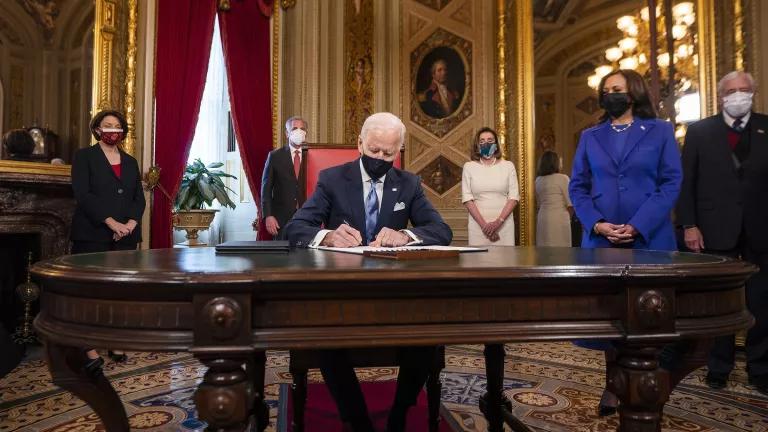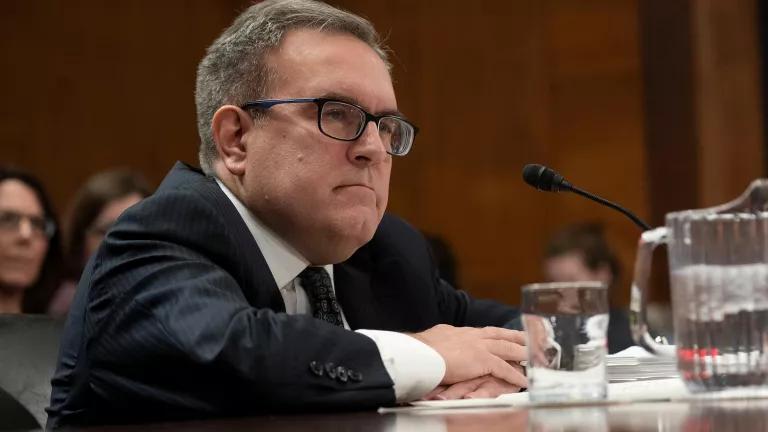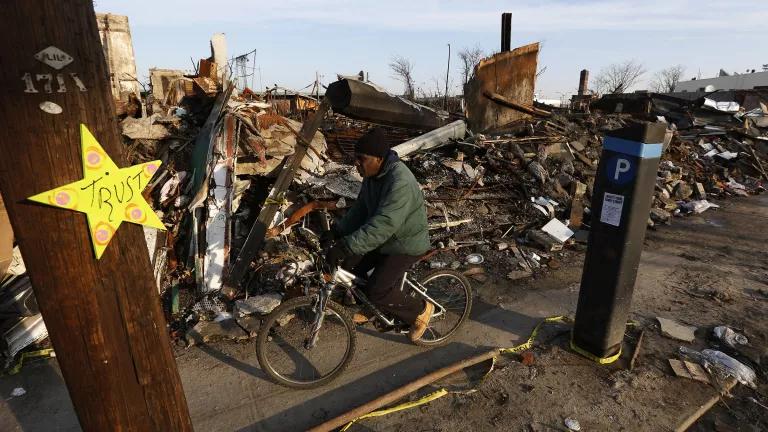The Real Lowdown: The Trump and Congressional Republican Assault on Our Environment, Vol. 25

A victory for Alaska’s forests—but further threats on the state's Arctic National Wildlife Refuge, plus more pipelines and ongoing attacks on our national monuments.
In his debut speech before the United Nations General Assembly, President Trump dropped 4,580 words on the heads of state and ministers from nearly every country on earth.
He thought it appropriate to talk about America’s prosperity, military prowess, and pummeling by hurricanes. He called on the world community to stand up to “rogue regimes” like North Korea and Iran, which he called “the scourge of our planet.”
Yet he couldn’t squeeze in a couple of words about an issue that the world has already united on: the true scourge of our planet, climate change.
Indeed, the president failed to discuss the growing dangers from our changing climate or his plans to withdraw the United States from the landmark Paris Agreement, which leaves―with Nicaragua joining the accord this week—America and Syria as the only two nations refusing to support the world’s most significant global climate action ever.
“Given that he’s abdicated his responsibility, it’s now on the leaders of other nations to rally the will of the people to leave our children a livable world,” Rhea Suh, NRDC’s president, wrote in the New York Daily News. “It’s on our state and local officials, investors, and businesses to press forward with the progress we need. And, more than even that, it’s on us, as American citizens, to demand better of our leaders.”
In other ways, Trump and his team kept up the assault on our health and environment, although there was one important victory for wilderness protection.
Roadless Rule
On September 20, a federal judge upheld the Roadless Area Conservation Rule, which was issued by the Clinton administration’s U.S. Department of Agriculture to limit the number of roads built in national forests. It’s an important win because it protects 50 million acres of wild national forests and grasslands for the public and future generations.
“This rule has weathered endless attacks by corporate interests and their allies. But it’s as enduring as the old-growth forest it protects,” said Niel Lawrence, NRDC’s Alaska director. “No rule has saved as much federal forestland from destruction. Now it has itself been saved, once again.”
Groups Outline Opposition to Trump Nominee for Clean Air Office
NRDC and allies sent a letter to key senators on September 19 with supporting documentation outlining their strong opposition to the nomination of Bill Wehrum, Trump’s pick to head the U.S. Environmental Protection Agency’s Office of Air and Radiation—enforcers of the Clean Air Act and protectors of clean air.
In 2006, President George W. Bush nominated Wehrum, a lobbyist who has represented coal, oil, gas, and chemical companies, for the same post, but Wehrum withdrew when it became clear the Senate wouldn’t confirm him.
And it shouldn’t this time around, either, NRDC and allies say. “In private practice with corporate law firms,” they wrote, “Mr. Wehrum has represented industrial interests in nearly 35 lawsuits that sought to weaken or void EPA clean air and public health safeguards. Americans deserve better for the nation’s chief clean air official.”
Will FERC Greenlight More Gas Pipelines?
With Trump nominee Neil Chatterjee now at its helm, the Federal Energy Regulatory Commission gave a green light this past week to a natural gas pipeline that had been rejected by the state of New York.
FERC has rejected only two pipelines in three decades, according to an analysis by the Center for Public Integrity and StateImpact Pennsylvania. But to John Moore, senior attorney for the Sustainable FERC Project at NRDC, the commission appears to break new ground. “Historically, FERC has been careful not to tread over state decisions and state prerogatives,” Moore said, adding a concern that future “close calls” could go more pipeline companies’ way.
Zinke Puts 10 National Monuments at Risk of Being Opened for Mining, Drilling, and Hunting
Back in August, U.S. Department of the Interior Secretary Ryan Zinke said he’d recommended changes to just a handful of our national monuments in a monument review he sent to the president. Now we know from a leaked memo that Zinke actually targeted 10 to be carved up for private profit.
Zinke’s memo called for downsizing Bears Ears and Grand Staircase Escalante, both in Utah; Cascade Siskiyou in Oregon; and Gold Butte in Nevada—but didn’t say by how much the boundaries should change. He also urged change in the use and/or management of six other monuments: Katahdin Woods and Waters in Maine; Organ Mountains–Desert Peaks and Rio Grande, both in New Mexico; Northeast Canyons and Seamounts Marine National Monument; Pacific Remote Island Marine National Monument; and Rose Atoll Marine National Monument.
If Trump accepts Zinke’s recommendations, he’ll have a fight on his hands. “We will stand up for the nearly three million people who urged the administration to protect these monuments—in court, if necessary,” NRDC’s Rhea Suh warned.
Trump Moves to Open the Pristine Arctic National Wildlife Refuge to Energy Exploitation
The Washington Post reported on September 15 that the Trump administration is moving to try to open up the Arctic National Wildlife Refuge for the first time in three decades to oil and gas drilling. “This is a really big deal,” said NRDC’s Niel Lawrence. “This is a frontal attack in an ideological battle. The Arctic is the Holy Grail.”
That’s this week’s Real Lowdown. NRDC has prepared a list of other far-ranging threats. And we’re vigilantly reporting on the administration’s assault on the environment through Trump Watch.



